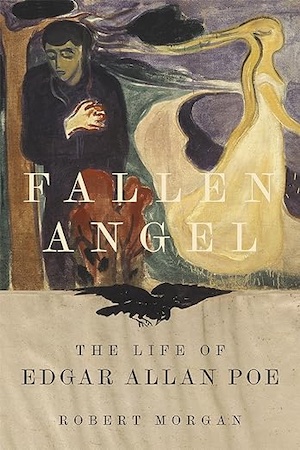By David Madden
Prominent among the numerous biographers who have embraced the complexities of the life and works of the poet and fiction writer Edgar Allen Poe are poets and novelists. Robert Morgan is both poet and novelist.
He is the prolific author of 15 volumes of poems, 6 novels, 5 collections of short stories, a biography of Daniel Boone, and Lions of the West: Heroes and Villains of Westward Expansion. For 52 years, he has taught at Cornell University. At age 79, he does not behave like a retiree. His present project is to imagine and create more short stories and poems.
In Fallen Angel, Morgan examines the controversies over time of Poe’s reputation as man and writer. He states that his chosen task is to prove the ways Poe’s works are expressions of phases of Poe’s life, from childhood’s hour to the gutter in Baltimore. “From childhood’s hour I have not been / as others were—” Morgan declares that his task is to “try to make some unexpected links between Poe’s life and his work.”
“A fellow student,” at the University of Virginia, “later recalled, ‘no one could say that he really knew him.’” John Pendleton Kennedy said, “Poe was given to the terrific.” Morgan writes, “He harbored within himself a self-destructive flaw he would call ‘the imp of the perverse.’” He felt “the shame of seeing his poverty exposed in the newspapers.” Poe was drawn into “a special intimacy for the natural world,” into solitude in the wilderness, seeking desolate, dark, shadowy places, out of a “love for what others might find bleak and repelling.”
Poe suffered the deaths of his mother and his father, show people, when he was very young. A pious hypocrite and adulterer, John Allan was only 32 when he took Edgar in as a foster child. Allan engaged in multifaceted acts of cruelty to Poe.
We follow Morgan’s pursuit of phases of Poe’s life in Richmond, Philadelphia, New York, and Baltimore. Morgan is convinced that Poe’s letters from Baltimore expressing the “wretchedness” of his poverty and health are “among his most accomplished works of art.” In the poem “Ulalume,” he expressed “the darkest hell he carried within himself.” The year before he died, Poe “supposedly” attempted suicide.
Morgan makes choices among Poe’s finest works. His view of “Lygeia” is that it “may have been his finest story.” By dramatizing “the horrors and tortures of time, ‘The Pit and the Pendulum,’” Morgan declares, is another of Poe’s finest stories. Two of his most popular poems are “The Bells,” “a robust experiment with sound,” and “The Raven,” the fame of which turned New York city “raven-mad.” He continued to revise “Eureka,” Morgan writes, “until the end of his life.”
Poe’s imagery evoked “the violence and terror and wonder of the ocean,” as in another of Morgan’s choices of Poe’s finest works “The City in the Sea” (“The Doomed City”), “a supremely erotic poem, in which Death, the consummation of the sexual act, drowns each in the dark, deep mystery of the female body, swallowing all in its triumph.”
Morgan expresses Poe’s fascination with the ways girls and women affected his life and thus his works. “In all these women, Poe sought to refind the ideal of his beautiful and dying mother,” Eliza Poe, the main heroine of his life.
A friend said that Poe was “always in love.” Loui Shew, a good friend, told Poe that “he needed a strong woman to take charge of him.” Poe conducted “courtships” with many women. He married fragile Virginia Clemm in 1836 when she was 13, a marriage that was “perhaps” never consummated; she died 11 years later after a lingering illness. Poe was engaged to Sarah Elmira Royster twice; she declared that “the love of my life was Edgar Poe.” Rufus Wilmot Griswold was Poe’s rival for Fanny Osgood’s affections. He “supposedly asked that Griswold serve as his literary executor.” Ironically, Griswold wrote a long memoir in which he “blackened Poe’s reputation.”
The new art and science of photography fascinated Poe. The numerous photographs of Poe have made his face universally one of the most familiar of all writers.
Poe, who died young in 1849, at only 40, left a life story and literary works that are still very much alive. We feel, as poet-critic Allen Tate said, that he is “Our cousin Mr. Poe.” “We can only hope that at the end Poe found peace and absolution . . . . The horror and fear in Poe’s work appeal to us because we recognize those emotions in ourselves.” Robert Morgan counts his Fallen Angel among those “ratiocinators” that “unlock the secrets of his poems and tales, his characters, his loves and conflicts.” He concludes, “Readers around the world for almost two centuries have cherished his wit, ingenuity, surprises, exotic scenes, and playfulness.”
Louisiana State University Robert Penn Warren Professor Emeritus, David Madden is the author of The Voice of James M. Cain, an innovative biography, Momma’s Lost Piano: An Impressionistic Memoir, many poems, and 15 works of fiction.




